|
|
|
Sort Order |
|
|
|
Items / Page
|
|
|
|
|
|
|
| Srl | Item |
| 1 |
ID:
140187
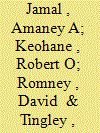

|
|
|
|
|
| Summary/Abstract |
Systematic investigation of attitudes expressed in Arabic on Twitter towards the United States and Iran during 2012–13 shows how the analysis of social media can illuminate the politics of contemporary political discourses and generates an informative analysis of anti-Americanism in the Middle East. We not only analyze overall attitudes, but using a novel events-based analytical strategy, we examine reactions to specific events, including the removal of Mohamed Morsi in Egypt, the Innocence of Muslims video, and reactions to possible U.S. intervention in Syria. We also examine the Boston Marathon bombings of April 2013, in which the United States suffered damage from human beings, and Hurricane Sandy, in which it suffered damage from nature. Our findings reinforce evidence from polling that anti-Americanism is pervasive and intense, but they also suggest that this animus is directed less toward American society than toward the impingement of the United States on other countries. Arabic Twitter discourses about Iran are at least as negative as discourses about the United States, and less ambivalent. Anti-Americanism may be a specific manifestation of a more general phenomenon: resentment toward powerful countries perceived as interfering in national and regional affairs.
|
|
|
|
|
|
|
|
|
|
|
|
|
|
|
|
| 2 |
ID:
177176
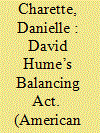

|
|
|
|
|
| Summary/Abstract |
Both champions and critics of “neorealism” in contemporary international relations misinterpret David Hume as an early spokesman for a universal and scientific balance-of-power theory. This article instead treats Hume’s “Of the Balance of Power,” alongside the other essays in his Political Discourses (1752), as conceptual resources for a historically inflected analysis of state balancing. Hume’s defense of the balance of power cannot be divorced from his critique of commercial warfare in “Of the Balance of Trade” and “Of the Jealousy of Trade.” To better appreciate Hume’s historical and economic approach to foreign policy, this article places Hume in conversation with Machiavelli, Guicciardini, Andrew Fletcher, and Montesquieu. International relations scholars suspicious of static paradigms should reconsider Hume’s genealogy of the balance of power, which differs from the standard liberal and neorealist accounts. Well before International Political Economy developed as a formal subdiscipline, Hume was conceptually treating economics and power politics in tandem.
|
|
|
|
|
|
|
|
|
|
|
|
|
|
|
|
| 3 |
ID:
131456
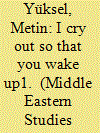

|
|
|
|
|
| Publication |
2014.
|
| Summary/Abstract |
This study focuses on the poetry of the well-known Kurdish poet Cegerxwîn (1903-84). Contextualizing Cegerxwîn's life and literary career within his specific social, political and historical circumstances, this article demonstrates the way in which Kurdish classical poetry during his madrasa education shaped Cegerxwîn's poetic creation. Furthermore, the oppression and exploitation of Kurdish peasants at the hands of tribal chiefs, sheikhs and nation-states contributed to Cegerxwîn's adoption of a Marxist and nationalist social and political standpoint. This article, attempting a closer reading of his poetry, suggests that at the essence of his poetry is found the continued use of the metaphor of awakening. Hence Cegerxwîn's poetics and politics can best be depicted as one of awakening the oppressed and subordinate social groups including the Kurds, peasants and workers from their deep sleep of oppression and exploitation. Through his Kurdish poetics and politics of awakening, it is argued, Cegerxwîn participates in the progressive political discourses of his times.
|
|
|
|
|
|
|
|
|
|
|
|
|
|
|
|
| 4 |
ID:
147968
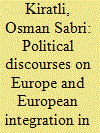

|
|
|
|
|
| Summary/Abstract |
Through a textual analysis of national election manifestos, this paper critically discusses political parties' discourses towards Europe and European integration in three European Union (EU) member states: Germany, which has always promoted further integration; the United Kingdom, which has consistently been a keen supporter of intergovernmentalism; and finally the Netherlands, one of the original six and a willing, yet cautious, supporter of supranational cooperation. By analysing how political parties frame European integration in their discourses, we aim to investigate the variance in national political cultures with respect to identity and self-identification with Europe as a determining factor of support for the process. This paper concludes that although European integration is structured around a framework of interests in all the six party discourses under analysis, the construction of national identities and hence the articulation of national interest in EU membership as well as the visions for the political structure of the union varies significantly.
|
|
|
|
|
|
|
|
|
|
|
|
|
|
|
|
| 5 |
ID:
139197
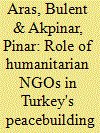

|
|
|
|
|
| Summary/Abstract |
This article illuminates the role of international HNGOs in Turkey's peacebuilding. Turkish HNGOs pursue low-level peacebuilding, focusing on interaction with grassroots, as opposed to the high-level peacebuilding of the state based on official interaction. Despite being independent, at times they become subsumed by the discourse, priorities and policies of the government and develop an interest in shaping official policies which carry the risk of politicizing the aid. While some of their key features such as flexibility, absence of conditionality, ensuring sustainability, relying on private donations and pursuing advocacy follow the mainstream peacebuilding lines, others such as culture and religion as catalysts and representing and promoting Turkey abroad demonstrate a deviation. Although the institutional consolidation of these HNGOs as a sector remains a distant goal, they are not likely to disappear given the considerable societal and political will behind their work. Their success depends on building a comprehensive strategy with efficient coordination and cooperation in a pluralist environment.
|
|
|
|
|
|
|
|
|
|
|
|
|
|
|
|
| 6 |
ID:
133965
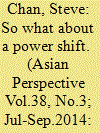

|
|
|
|
|
| Publication |
2014.
|
| Summary/Abstract |
In this article I consider the general idea of power shifts, with specific reference to the discourse on "China's rise." I raise theoretical and policy concerns about the nature, sources, and consequences of China's reemergence as a regional power, and call attention to some analytic tendencies and implicit assumptions featured in this discourse.
|
|
|
|
|
|
|
|
|
|
|
|
|
|
|
|
|
|
|
|
|